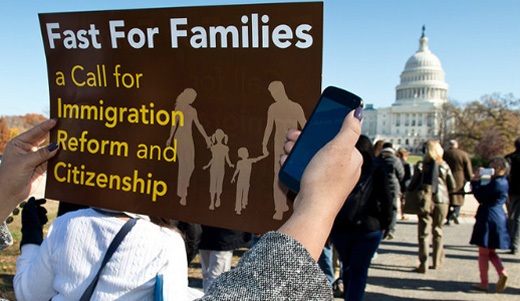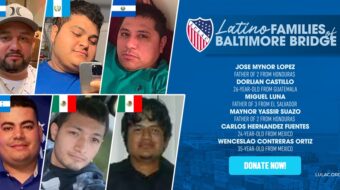
As the year 2013 draws to an end, the fight for immigrants’ rights, and especially for the legalization of the estimated 11 million undocumented immigrants believed to be in the United States, continues. There is intense activity at the base, small advances in the executive field, but more or less a complete bottleneck in the legislative efforts. That bottleneck has a name: John Boehner.
During the summer, many labor and community organizations exerted pressure on Republican members of the House of Representatives, to get them to agree in principle to legalization with citizenship. The balance of power in the House is currently 200 Democrats versus 232 Republicans, so it was necessary for 25 or so Republicans to pledge support (remember that although most Democrats support legalization of the undocumented, not all do. This means that even more Republicans have to be won over). According to reports, this objective may have been achieved .
However, the Republican Speaker of the House, John Boehner, has stated that he will follow the “Hastert Rule” named for his predecessor, John Hastert, who refused to let any legislation come up for a vote that does not have a support of the majority of Republican members of the House. So Boehner has either to be backed down, or 217 signatures of House members have to be got for a “petition to discharge”, which allows a direct vote of the whole House without going through committees. Now, there are only 5 work days in the House until it adjourns on December 13, so prospect of getting any legislation done this year is increasingly doubtful. But immigrants’ rights activists are not giving up.
Among supporters of progressive immigration reform there is basic unity as to goals, including legalization of the undocumented with full rights for all, but there are some divergences of opinion on strategy and tactics.
Some are understandably pessimistic about a legislative fix, and therefore are concentrating on pressuring the Obama administration to expand the categories of people who will be temporarily protected from arrest and deportation. There has been some progress. On November 15 President Obama extended the DACA program, which defers deportation for “dreamers”, young people who were brought here without papers when they were minors, to members of military families, using the legal mechanism of “Parole in Place.”
This has raised hopes that more people could be brought under such protection which, without giving anybody a green card and a path to citizenship, at least allows them to live and work in the United States without fearing an immigration cop’s knock on the door. This has stirred the hope other categories of people, for example the undocumented parents of both dreamers and U.S. citizen children, could be covered. Such a move, though not definitively solving the undocumented immigration problem, would have public support and would serve the interests of family unity and child welfare. Obama said on November 24 that he can’t do this, implying that it would be illegal. But then, how was it legal for the White House to give a break to “Dreamers” and military families? The Republican right would yell, but they yell anyway, and opinion surveys consistently show that a majority of Americans support a humane immigration policy.
Some are so pessimistic about the legislative effort that they sharply condemn it. A special shock that reinforced this attitude was the inclusion in the Senate’s immigration bill, S 744, which was passed in June, of negative elements, which not only trade off legalization of the undocumented for new repressive and guest worker measures, but also endanger the ability of lower income undocumented immigrants to get legalization at all. The House bill (HR 15) is less extreme, but still has problems, and for now it appears blocked. So there are calls to abandon the legislative effort and concentrate everything on pressuring the administration to stop all deportations. But even if this proves possible, it does not give undocumented immigrants access to permanent resident status (“green cards”) let alone eventual U.S. citizenship. A new administration coming in after the 2016 elections could, by a new executive order, wipe out everything that has been gained by executive order. There is a lack of sophistication in some of these arguments: It is assumed that if the immigrants’ rights movement, or some considerable sector of it, boycotts activity in Congress that this activity will be rendered harmless. On the contrary, it would hand the whole thing over to the most extreme reactionaries.
While some organizations pressure the House of Representatives to break the bottleneck, many are also pressing the White House to suspend more deportations. There are marches, sit-ins, civil disobedience, fasts and other protest actions all over the county, some aimed at the legislative and others at the legislative branch; most at both.
Meanwhile, deportations continue at a fast clip, and political instability on top of a coffee crop failure in Central America is leading more people to attempt the dangerous trip north.
Photo: Fast for Families












Comments